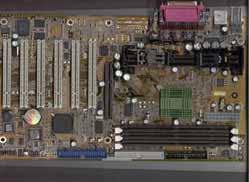Microstar K7Pro AMD 750 Slot-A ATX
by Mike Andrawes on March 19, 2000 10:55 PM EST- Posted in
- Motherboards
We liked the last Microstar board that we tested so much that we awarded it the AnandTech Editor's Choice Gold Award. What made that board so great was its feature set that was just about as good as it gets. When it was time for an Athlon board from MSI, we were definitely excited.
However, the first MSI Athlon board was nothing more than the AMD Fester reference design. While that's not necessarily a bad thing, it didn't make the MSI stand out too much. Their second attempt at an Athlon board? The K7Pro. The BXMaster was the last in MSI's i440BX line. Similarly, the K7Pro should be the last MSI Athlon board based on the AMD Irongate chipset and goes head to head with the ASUS K7M feature for feature. But is it worth it in the face of the coming onslaught of KX133 boards?
|
Motherboard Specifications |
|
| CPU Interface |
Slot-A
|
| Chipset |
AMD 750 Irongate
AMD 751 North Bridge AMD 756 South Bridge |
| L2 Cache |
N/A (on-chip)
|
| Form Factor |
ATX
|
| Bus Speeds |
90
/ 95
100 - 125 MHz (in 1 MHz steps) 133 / 140 / 150 |
| Voltages Supported |
Auto Detect
|
| Memory Slots |
3 168-pin DIMM Slots
|
| Expansion Slots |
0 AMR Slots
1 AGP Slot 6 PCI Slots (2 Full Length) 1 ISA Slot (1 Shared / 1 Full Length) |
| Onboard Sound |
Creative
Labs ES1373/ES1375 (optional)
|
| BIOS |
AMI Simple Setup 1.21A
|
The Good
The K7Pro is a "true" AMD 750 based solution in that it makes use of AMD manufactured North and South bridges, more specifically the 751 North Bridge and the 756 South Bridge. The AMD 751 North Bridge supports AGP 2X, the 100MHz DDR FSB frequency of the Athlon, and PC100 SDRAM support. The AMD 756 South Bridge rounds off the feature set by adding support for Ultra ATA 33/66 devices on the two integrated IDE channels.
In contrast, the newer KX133 chipset on the EPoX 7KXA and ASUS K7V-RM offers PC133 memory and AGP 4X support as the main two advantages over the AMD 750 chipset. For more information about the KX133 chipset and its advantages over the AMD 750, take a look at our review of the VIA Apollo KX133 chipset Part 1 and Part 2.
The most obvious change by MSI to the Fester reference design is a 6/1/1/0 (PCI/ISA/AGP/AMR) that fills the standard ATX board. Thanks to MSI's custom PCI arbiter chip, all 6 of those PCI slots support bus master devices. PCI slots 1 and 6 still share an IRQ, as do slots 3 and 5. Slot 4 shares an IRQ with the onboard USB controller.
Optional integrated Creative Labs ES1373/ES1375 sound is the next big change to the Fester reference design. These chipsets will provide you with solid hardware based PCI audio that is more than sufficient for all but the hardcore gamer who wants 3D positional audio.











0 Comments
View All Comments